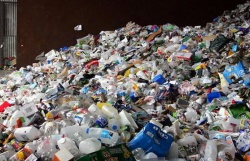Difference between revisions of "Recycling"
(Created page with "thumb|250px| The term recycling is commonly used today to refer to the practice of using resources prudently and fully. This practice had grown out o...") |
|||
| Line 1: | Line 1: | ||
[[File:Recycling.jpg|thumb|250px|]] | [[File:Recycling.jpg|thumb|250px|]] | ||
| − | The term recycling is commonly used today to refer to the practice of using resources prudently and fully. This practice had grown out of a concern for pollution, an awareness that the Earth’s resources are limited and a growing respect for nature. A Buddhist would be motivated to try to recycle for all these reasons but also by the Buddha’s teachings of thoughtful gratitude and respect for all life. The Buddha envisaged his monks and nuns living entirely on the donations they received from others and so he encouraged them to use what they were given fully and with care. According to the commentary, Ānanda once said that when robes were too shabby to be worn any longer, he would find numerous other uses for them until they had been fully utilized and worn out (Ja.II,23). The Buddha also taught his disciples to be careful towards both animal and plant life. This would include taking from nature only what we need, using it prudently and giving something back in return. | + | |
| + | |||
| + | The term recycling is commonly used today to refer to the practice of using resources prudently and fully. This practice had grown out of a [[concern]] for pollution, an [[awareness]] that the [[Earth’s]] resources are limited and a growing [[respect]] for [[nature]]. | ||
| + | |||
| + | A [[Buddhist]] would be motivated to try to recycle for all these [[reasons]] but also by the [[Buddha’s teachings]] of thoughtful [[gratitude]] and [[respect]] for all [[life]]. | ||
| + | |||
| + | The [[Buddha]] envisaged his [[monks and nuns]] living entirely on the {{Wiki|donations}} they received from others and so he encouraged them to use what they were given fully and with care. | ||
| + | |||
| + | According to the commentary, [[Ānanda]] once said that when [[robes]] were too shabby to be worn any longer, he would find numerous other uses for them until they had been fully utilized and worn out (Ja.II,23). | ||
| + | |||
| + | The [[Buddha]] also [[taught]] his [[disciples]] to be careful towards both [[animal]] and [[plant life]]. This would include taking from [[nature]] only what we need, using it prudently and giving something back in return. | ||
{{R}} | {{R}} | ||
[http://www.buddhisma2z.com/content.php?id=334 www.buddhisma2z.com] | [http://www.buddhisma2z.com/content.php?id=334 www.buddhisma2z.com] | ||
[[Category:Buddhist Terms]] | [[Category:Buddhist Terms]] | ||
Latest revision as of 04:57, 8 January 2016
The term recycling is commonly used today to refer to the practice of using resources prudently and fully. This practice had grown out of a concern for pollution, an awareness that the Earth’s resources are limited and a growing respect for nature.
A Buddhist would be motivated to try to recycle for all these reasons but also by the Buddha’s teachings of thoughtful gratitude and respect for all life.
The Buddha envisaged his monks and nuns living entirely on the donations they received from others and so he encouraged them to use what they were given fully and with care.
According to the commentary, Ānanda once said that when robes were too shabby to be worn any longer, he would find numerous other uses for them until they had been fully utilized and worn out (Ja.II,23).
The Buddha also taught his disciples to be careful towards both animal and plant life. This would include taking from nature only what we need, using it prudently and giving something back in return.
